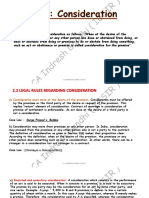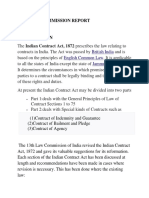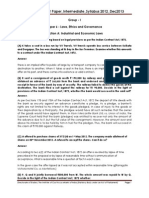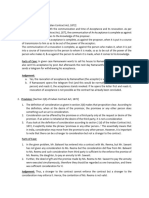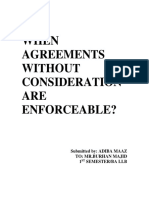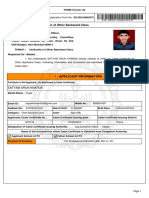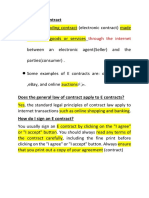SHREE PRAGALBH COMMERCE PROFESSIONAL LAW / C.A.F.
ANSWER KEY
(a) In India, consideration may proceed from the promisee or any other person who is not a party to the
contract. According to the definition of consideration as given in Section 2(d),when at the desire of
the promisor. the promisee or any other person does something, such an act is consideration. In
other words, there can be a stranger to a consideration but not stranger to contract. [Chinnaya Vs.
Ramayya] In the given case between defendant (Mr. Mohanlal) and plaintiff (Mr. Chotelal) the
consideration has been furnished on behalf of the plaintiff (Mr. Chotelal) by his father (Mr. Sohanlal).
Although, the plaintiff was a stranger to the consideration but since he was a party to the contract
he could enforce the promise of the promisor, since under Indian law, consideration may be given by
the promisee or anyone on his behalf vide Section 2(d) of Indian Contract Act.
Thus, consideration furnished by Mr. Sohanlal to Mr. Mohanlal constitutes sufficient consideration
for the plaintiff (Mr. Chotelal) to sue the. defendant on the promise. Held, Mr. Chotelal was entitled
to a decree for the right to use that 1 acre of land.
(b) Provision: According to Indian Contract Act, 1872. All Agreements in restraint of any trade or which
are opposed to public policy are void and are such which are expressly declared by law to be a void
agreement.
Analysis: In the given case, Mr. X has been fighting a long drawn litigation with Mr. Y To support his
legal campaign he enlists the services of Mr. C who is a judicial officer stating that the amount of 10
lakhs would be paid to him if he does not take up the brief of Mr. Y. As this agreement is an
agreement which is void and opposed to public policy hence, it cannot be enforced.
Concession: As at the end X refuses to pay Mr. C the decided amount Mr. C cannot recover the
amount promised by Mr. X under the provision of Indian Contract Act. 1872 as it is a void agreement
b/w the two.
(c) The finder of goods has no right to sue the owner for compensation incurred as an expenses done
Voluntarily or incurred by him to presume the goods and to find the true owner, but he may retain
the goods against the owner until he receives such compensation, until then the finder may retain
the goods with him.
In the given case X finds a wallet in a restaurant and hands it over to the manager as the true owner
could not be traced. After a week a demands the wallet back from the manager, which he refuses to
give, saying it did not belong to X.
Held, the manager must return the wallet to X as he being the finder of lost goods was entitled to
retain the goods found against everybody except the true owner.
Thus. X can recover the wallet from the manager.
(d) Answer
(a) Subsequent or Supervening impossibility (Becomes impossible after entering into contract):
When performance of promise become impossible or illegal by Occurrence of an unexpected
event or a change of circumstances beyond the contemplation of parties, the contract becomes
void e.g. change in law etc.
�SHREE PRAGALBH COMMERCE PROFESSIONAL LAW / C.A.F.C
Also, according to section 65 of the Indian Contract Act, 1872, when an agreement is discovered
to be void or when a contract becomes void, any person who has received any advantage under
such agreement or contract is bound to restore it, or to make compensation for it to the person
from whom he received it. In the given question, after Mr. X and Mr. Y have entered into the
contract to supply 50 tons of sugar, the event of flood occurred which made it impossible to
deliver the sugar within the stipulated time. Thus, the promise in question became void.
Further, Mr. X has to pay back the amount of 50,000 that he received from Mr. Y as an advance
for the supply of sugar within the stipulated time. Hence, the contention of Mr. Y is correct.
(e) Answer :
(i) Agreements made out of love and affection are valid agreements: A written and registered
agreement based on natural love and affection between the parties standing in near relation (e.g.,
husband and wife) to each other is enforceable even without consideration. The various
conditions to be fulfilled as per Section 25(1) of the Indian Contract Act, 1872:
(A) It must be made out of natural love and affection between the parties.
(B) Parties must stand in near relationship to each other.
(C) It must be in writing.
(D) It must also be registered under the law.
Hence, the agreements made out of love and affection, without consideration, shall be valid, if the
Above conditions are fulfilled.
(ii) Promise to pay a time barred debt cannot be enforced: According to Section 25(3) of the Indian
Contract Act, 1872, where a promise in writing signed by the person making it or by his
authorised agent, is made to pay a debt barred by limitation is valid without consideration.
Hence, this statement is not correct.
Note: The above statement can be correct also on the basis of the "Discharge of Contract by Lapse of
time" as per Limitation Act, 1963, and accordingly it can be mentioned that contract should
be performed within a specified period as prescribed by the Limitation Act, 1963 and if no action
is taken by the promisee within the specified period of limitation, he is deprived of remedy at
law.
(f) Wagering Agreements and Contingent Contracts: The two can be distinguished below:
1. A wagering agreement is a promise to give money or moneys worth upon the determination or
ascertainment of an uncertain event. A contingent contract on the other hand, is a contract to do or
not to do something if some event, collateral to contract does or does not happen.
2. A wagering agreement consists of reciprocal promises, while a contingent contract may not
contain reciprocal promises.
3. In a wagering agreement the uncertain event is the sole determining factor, while in a
contingent contract the event is only collateral.
4. A wagering agreement is essentially of a contingent nature whereas a contingent contract may
not be of a contingent nature.
�SHREE PRAGALBH COMMERCE PROFESSIONAL LAW / C.A.F.C
5. A wagering agreement is void, while a contingent contract is valid. In a wagering agreement the
parties have no other interest in the subject matter of the agreement except the winning or losing
of the amount of the wager. In other words, a wager is a game of chance, but this is not so in case
of a contingent contract.
(g) Answer:
Under certain circumstances, a person may receive a benefit to which the law regards another
person as better entitled, or for which the law consider he should pay to the other person, even
though there is no contract between the parties. Such relationships are termed as "Quasi-Contracts"
or Implied Contracts. A quasi contract rests on the ground of equity that a person shall not be
allowed to enrich himself unjustly at the expense of another.
Sections 68 to 72 of the Indian Contract Act, 1872 have prescribed the following relationships
creating quasi-contractual relationship:
1. Supply of necessaries: Under Section 68, if a person, incapable of entering into a contract, or
anyone whom he is legally bound to support, is supplied by another person with necessaries
suited to his conditions in life, the person who has furnished such supplies is entitled to be
reimbursed from the property of such incapable person.
2. Payment by an interested person: It has been laid down in Section 69 of the Indian Contract Act
that a person who is interested in the payment of money which another is bound by law to pay,
and who therefore pays it, is entitled to be reimbursed by the other.
3. Obligation to pay for non-gratuitous Act: Section 70 of the Indian Contract Act states that where
a person lawfully does anything for another person or delivers anything to him not intending to do
so gratuitously, and such other person enjoys the benefit thereof, the later is bound to make
compensation in respect of or to restore, the things so done or delivered.
4. Responsibility of finder of goods: Under Section 71 of the Act, a person who finds goods
belonging to another, and takes them into his custody, is subject to the same responsibility as a
bailee.
5. Case where money is paid by mistake or under coercion: Finally, Section 72 of the Indian
Contract Act provides that a person to whom money has been paid, or anything delivered, by
mistake or under coercion, must repay or return it. Thus, quasi-contractual right is always a right
to money and generally, though not always to a liquidated sum of money. It does not arise from
any agreement between the parties concerned, but is imposed by the law. It is a right which is not
available against whole world but against a particular person or persons only. There is no contract
between the parties in cases of quasi contracts. Yet they are put in the same position as if there
were a contract between them.
�SHREE PRAGALBH COMMERCE PROFESSIONAL LAW / C.A.F.C
(h) Answer:
A contract may be discharged by the operation of law in the following manner:
(i) By death: ln contract involving personal skill and/or ability, the Contract is terminated on the
death of the promisor. In other Contracts the rights and liabilities of a deceased person pass on
to the legal representatives of the deceased person.
(ii) By merger: Merger takes place when an inferior right accruing to a party under a contract
mergers into a superior right accruing to the same party under the same or same other
contract.
(iii) By insolvency: When a person is adjudged insolvent he is discharged from all liabilities
incurred prior to his adjudication.
(iv) By unauthorised attraction of the terms of a written agreement: Where a party to a contract
makes any material alteration in the contract without the consent of the other party, the other
party can avoid the, contract. A material alteration is one which changes, in a significant
manner, the legal identity or character of the contract or the rights and liabilities of the parties
to the contract.
(v) By rights and liabilities becoming vested in the same person: Where the liabilities and rights
under a contract vest in the same person, for example, when a bill gets into the hands of the
acceptor. The other parties are discharged.
(i) Answer:
The general. rule is that an agreement without consideration is Void.
However, there are certain exceptions to this rule. In the following cases, the agreement though
made without consideration, will be valid and enforceable.
1. Natural love and affection:
A written and registered agreement based on natural love and affection between the parties
standing in near relation (e.g. husband and wife) to each other is enforceable without
consideration.
2. Compensation for past voluntary services: A promise to compensate wholly or in part, a person
who has already voluntarily done something for the promisor, is enforceable, although it is
without any consideration today.
3. Promise to pay time barred debt:
Where a promise in writing signed by the person making it or by his authorised agent is made to
pay a debt barred by limitation it is valid and binding even though without consideration.
4. Agency:
No consideration is necessary to create an agency.
5. Completed Gift:
In case of gifts the rule no consideration, no contract is not applicable.
6. Bailment:
No consideration required for this.
7. Charity:
�SHREE PRAGALBH COMMERCE PROFESSIONAL LAW / C.A.F.C
If one promises to undertake liability to contribute to charity, the contract shall be valid even
though without consideration.
(j) Answer:
Section 68 of the Contract Act, deals with the cases of necessities of life Supplied to a minor. The Act
provides that "if a person incapable of entering into a contract or anyone, when he is legally bound
to support is supplied by another person with necessaries suited to his condition in life, the person
who has furnished such supplies is entitled to be recovered from the property of such incapable
person."
Thus, a minor is not personally liable for the payment of necessities supplied to him, the payment
for such necessities can be recovered only out of the property of the minor. The supplier will lose
the price of necessities, if the minor does not possess any property. What constitutes necessities
shall be determined with reference to the status and the circumstances of particular minor.
Simple example of necessaries are food, clothing and shelter but necessaries will also include
minor's medical expenses, cost of defending a minor's civil or criminal proceedings, provisions for
education etc. Loan taken by minor to obtain necessities also bind a minor.
The point to be noted is that the parent or guardian of a minor cannot be made responsible for any
good supplied to a minor unless these goods are Supplied to a minor as the agent of the parent or
guardian.






